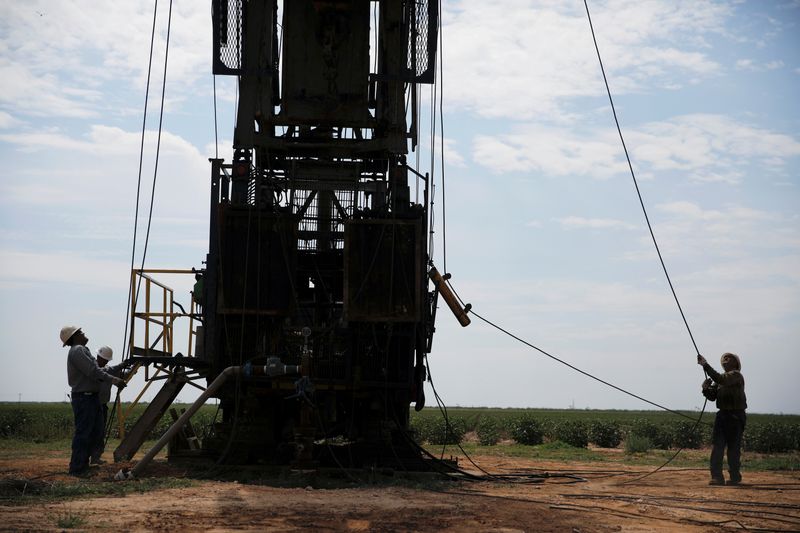By Devika Krishna Kumar
NEW YORK (Reuters) - Brent crude slid 7% on Thursday after President Donald Trump restricted travel to the United States from Europe as part of measures to try to halt the spread of coronavirus after the World Health Organization described the outbreak as a pandemic.
A flood of cheap supply coming onto the market from Saudi Arabia and the United Arab Emirates compounded pressure on prices. The Gulf Arab producers are raising production as they go on the offensive in an oil price war with Russia.
Brent crude (LCOc1) was down $2.57, or 7.2%, at $33.22 a barrel while U.S. West Texas Intermediate Texas crude (CLc1) was down $1.48, or 4.5%, at $31.50.
Global equities plunged and the Dow Jones index was on course for its worst performance since Wall Street's "Black Monday" crash of 1987 after Trump announced the travel restrictions.
Prices pared losses briefly after the Federal Reserve Bank of New York said it would increase Treasury purchases and introduce new repo operations, but the bounce faded quickly across markets.
"Global market carnage continues as Wall Street struggles to grasp how long the global pandemic will disrupt travel, trade and daily life," said Edward Moya, senior market analyst at OANDA in New York.
"Brent crude seems poised to sell off another 10% here as the demand outlook seems like it will only get worse."
Global oil demand is set to contract in 2020 for the first time in more than a decade, with the International Energy Agency this week lowering its annual forecast by almost 1 million barrels per day, or 1% of global demand.
Demand in the first quarter has fallen sharply on the year, mostly because of the impact of the virus on economic activity in China.
Both Brent and WTI are down about 50% from highs reached in January. They suffered their biggest one-day declines since the 1991 Gulf War on Monday after Saudi Arabia launched a price war.
The six-month Brent contango spread
Contango is where the futures price of a commodity is higher than the price to buy it now. That encourages oil firms and traders to pump oil into storage - either on land or in tankers at sea - with an aim to sell it later at a profit.
The cost to transport oil on supertankers soared as major producers scrambled to secure vessels to ship more crude and companies looked for vessels for storage.
As top oil exporter Saudi Arabia moved quickly to boost output, Russia stuck by the decision that led last week to the collapse of its alliance with Riyadh and other producers. Moscow said that there was no point cutting output because it would likely be too little to compensate for the virus' impact on global demand.
For now, both sides are digging in for the price war, said Ehsan Khoman, head of MENA research and strategy at MUFG.
"We believe that both sides have enough financial capacity and sufficiently divergent goals to sustain the oil price war for many quarters, not months," he said.
Saudi Arabia has already stepped up efforts to squeeze Russia's Urals oil grade out of its main markets by offering its own cheap barrels to refiners worldwide that buy Russian crude, seven oil sources said.

With demand falling sharply and output rising quickly, the market is facing a big surplus in April. Estimates for the scope of the glut vary. It could be as much as 6 million bpd, said Kirill Tachennikov, director and senior oil analyst at BCS Global Markets in Moscow.